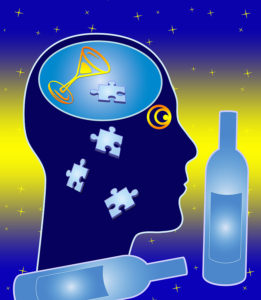 When scientists announced that drinking red wine can boost health and longevity, a lot of seniors rejoiced. Finally, someone to say alcohol is good for you! But the benefits of drinking for seniors may not be worth it.
When scientists announced that drinking red wine can boost health and longevity, a lot of seniors rejoiced. Finally, someone to say alcohol is good for you! But the benefits of drinking for seniors may not be worth it.
I’ve written about a lot of substances that are detrimental to brain health, but so far, I’ve stayed away from writing about drinking. My reason is simple: I am biased: I have abstained from all alcohol for 31 years. I know how great I feel without alcohol, and don’t understand why some friends can’t seem to live without it. I believe that life with a clear head is far better. And I have more fun without the hangovers.
So I hesitate to tell anyone to stop drinking because it’s really a personal decision. On the other hand, as we age, we need all the good habits we can adopt because staying healthy, energetic, and disease-free isn’t an easy ride. Also, (and this may be my bias) many people see themselves as moderate drinkers but aren’t really. I’ve seen too many who turn stupid when they drink and for non-drinkers, that’s just annoying.
While it’s abundantly clear that heavy alcohol use presents a great risk for developing dementia, even normal drinking can put some seniors at risk.
When I was practicing as a psychologist in California, I’ll never forget a client who came in for evaluation. He was a 50-year-old engineer, highly educated, but he couldn’t hold a job. Testing revealed his cognitive abilities had fallen way below average. It turned out that a lifetime of daily drinking had destroyed his brain. Yet no one in his family thought of him as an alcoholic.
The amount of drinking that is considered “heavy drinking” isn’t clear cut. Just as with smoking, some people have genetic constitutions that protect them no matter how many cigarettes or drinks they consume. But that is rare.
How Alcohol Harms Aging Brains
Drinking alcoholic beverages harms us in many ways. It acts as a neurotoxin, damaging structures of the brain and that can lead to seizures, brain atrophy (loss of volume), memory loss, sleep interference, and cerebellar damaging (causing unsteadiness, slurred speech, and inability to walk.
Seniors drinking alcohol may have a hard time sticking to a healthy diet and exercise program. A drink or two can relax one’s resolve to limit unhealthy carbs and sugar (alcohol itself is a sugar). Drinking limits one’s inhibition and encourages more drinking and unhealthy food bingeing.
Seniors and Alcohol Detoxification
Alcohol places a great burden on our livers and the detoxification pathways critical to overall health. It interferes with sleep, blocking our ability to reach REM sleep. When this happens, sleep becomes fragmented and memory formation is disrupted.
Worse, alcohol is a cause of cancer in the liver, rectum, throat, and breast in women. Granted, truly moderate drinking, especially small amounts of red wine, may be beneficial. Red wine has flavanoids that benefit health in ways other beverages do not. It’s best to limit intake to several ounces.
Alcohol and Inflammation
In one study of over 4,000 people in three different countries, test results showed decreased inflammation in people who reported light to moderate alcohol consumption (estimated at one to two drinks per day). However, those who reported heavy drinking (three to four drinks per day) had increased inflammation and risk of dementia and cognitive impairment.
Red Wine for Seniors
Some of the best benefits of alcohol come from the skins of grapes. Red wine contains a potent antioxidant called resveratrol. Pinot noir has very high levels of resveratrol. The phenolic acid in champagne may also prove to be an aid to better thinking.
Most health experts advise staying away from cocktails and hard alcohol. For one thing, the blood sugar-spiking of mixed drinks can wreak havoc on your brain. Continually raising your blood sugar can lead to insulin resistance, increasing the risk of diabetes in older people.

Recent Comments